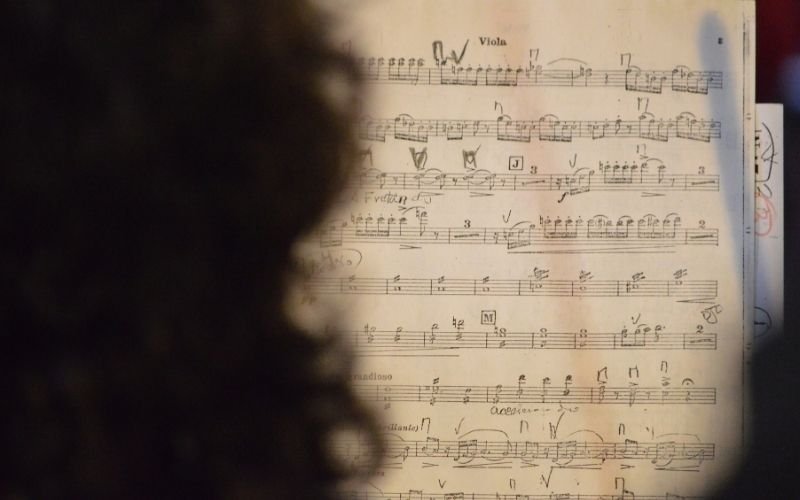Page turner: a behind-the-scenes look at a job in the classical music world
Music is an art that relies on a number of different professions, each with different skills and roles that are as varied as they are essential: musicians, stage managers, sound engineers, composers, conductors, not forgetting the page-turners, whose discreet but essential role deserves special attention.
Turning the pages of a score, far from being a simple mechanical task, is an art in itself, requiring great finesse and impeccable synchronization with the musician. Where does this craft come from? Does it still exist today? Who are the page-turners? Newzik reveals the secrets of this behind-the-scenes profession.
Page turner job: definition
The job of page turner, often associated with the world of classical music, is of particular, if discreet, importance in live performances. This essential but little-known profession consists of assisting musicians, particularly pianists, by turning the pages of the score at the right moment during a concert. This role, though seemingly straightforward, requires great timing, a good understanding of the music and the ability to anticipate the artist's needs to ensure the smooth running of the performance.
Pianist with her page-turner during a concerto
History and origins of the page turner trade
Although the origins of the page-turner's trade are poorly documented, we can assume that the need for an assistant to turn the pages of pianists' scores arose when musical compositions became more complex and longer, exceeding musicians' ability to fully memorize their scores or manage them themselves.
Job description: what does a page turner do?
Preparing music scores before the concert Before the concert begins, the page turner must make sure he or she is familiar with the score. This preparation includes learning the order of the pages and understanding the specific moments when they should be turned chord with the tempo and movement changes of the music. It is often necessary to mark certain sections of the score to indicate passages where page turns are particularly critical.
During the concert, the page-turner 's main task is to turn the pages of the score in perfect synchronization with the musician. This task must be accomplished with meticulous precision and absolute discretion, so as not to disrupt the musical performance and allow the musician to concentrate fully on his interpretation.
Who can become a page turner?
There is no training to specialize as a page turner, and the role of page turner is generally dedicated to music-loving students attending conservatories. In general, page turners acquire their skills informally, either by learning directly on the job, or through mentoring under the tutelage of experienced musicians or other seasoned page turners.
Page turner: a viable job?
Although becoming a page turner can offer a rewarding experience and a close relationship with music and musicians, more often than not, the profession does not provide a stable and sufficient source of income. Most page turners work part-time or occasionally, often in parallel with other professional or academic activities in the music world. Opportunities to work as a page turner are mostly linked to events such as classical music concerts or recitals. Salary can vary considerably, with many opportunities being more student volunteering than paid employment.
Skills and qualities needed to become a page turner
Synchronization and precision: being in harmony with the musician. The page turner must perfectly synchronize his actions with those of the musician, understanding the rythm, tempo, and structure of the piece, while remaining attentive to subtle cues during the performance.
Discretion and professionalism: mastering the gesture and blending into the environment. Turning pages is an art requiring technique and timing. The page turner's gesture must be fluid and almost imperceptible, ensuring that each page is turned without disrupting the musical flow or attracting the audience's attention. The page turner must act with discretion to minimize his or her presence and avoid distraction.
Musical knowledge: knowing scores and cues. A good knowledge of music notation and the structures of the works helps the page turner to follow the score efficiently, and to anticipate critical moments when turning pages without explicit instructions.
Stress management: staying calm under pressure. Live performances can generate stress, and it's important for the page turner to manage his own stress while remaining focused on the task in hand.
🎹 Are you passionate about music and intrigued by the job of a page turner? Go behind the scenes of classical music and discover the French film La Tourneuse de pages. Releasedin 2006, the film focuses on a young musician who tries out for the conservatory entrance exam and, ten years later, becomes a page turner for the pianist she failed. Complement your artistic and cinematographic culture with our selection of 9 films featuring the conductor's profession on the big screen.
Page turner: when modernity meets tradition
Tablets, iPads and page-turning pedals: the digital age at the service of music
The advent of digital tablets has revolutionized many aspects of our daily lives, including the way music is read and performed. In classical music, the use of digital tablets to display scores has brought great flexibility to performers, reducing the need to carry stacks of paper scores. At the same time, page-turning pedals enable musicians to turn the pages of digital scores without using their hands, simply by using their foot to activate the pedal.
Using iPads and dedicated applications, such as Newzik, to read digital scores offers musicians advanced functionality. Not only can these applications store large quantities of scores, they also offer features such as automatic bookmarking, zooming and scrolling, which can be controlled by page-turning pedals. When using an iPad, the musician can configure the device to turn pages either manually, or by using a pedal connected via Bluetooth. This method allows the musician to keep his or her hands free for playing, which is particularly useful for pianists who can't afford to let go of their instrument.
Have new technologies put an end to the job of page turner?
These technologies reduce the need for a human presence to turn each page, allowing musicians greater autonomy during a performance, recital or concert. While digitization offers powerful tools to facilitate performances, it also brings challenges, not least in terms of reliability and dependence on electronic devices. Hardware failures or software errors can disrupt a performance, requiring page-turners to be ready at times to intervene manually.
In some contexts, the use of a page turner is still preferred. Some musicians feel that the presence of a page-turner enables better adaptation to unforeseen events, and a more human and responsive interaction. What's more, in environments where the use of technology may be restricted or inappropriate, such as certain historical sites or very formal concerts, page turners remain a necessity.
🎶 Are you a professional or amateur musician? Annotate, edit and organize your sheet music easily and in no time with Newzik App. The app offers a host of features, including a metronome and the ability to turn the pages of your scores directly from your iPad. Whether you're playing alone or in a group, Newzik will revolutionize your rehearsals!

